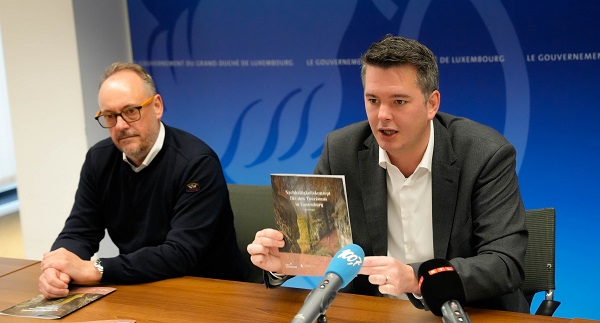 (L-R) Ramon Hemmer, Erliefnis Baggerweier ASBL; Lex Delles, Luxembourg's Minister of the Economy, SMEs, Energy and Tourism;
Credit: MECO
(L-R) Ramon Hemmer, Erliefnis Baggerweier ASBL; Lex Delles, Luxembourg's Minister of the Economy, SMEs, Energy and Tourism;
Credit: MECO
On Tuesday 17 December 2024, Luxembourg's Minister of the Economy, SMEs, Energy and Tourism, Lex Delles, presented the concept for sustainable tourism in the Grand Duchy.
As reported by the Ministry of the Economy, this concept marks an "important step" in the evolution of the tourist offer, by placing the principles of sustainability at the heart of its development.
With this concept, the ministry said Luxembourg intends to respond to major challenges, in particular to contribute to climate objectives, while shaping quality tourism, which respects people and nature, and which strengthens the local economy. It also introduces a structured approach, including objective indicators to measure the progress made and a clear framework to guide and encourage projects.
Included in the national tourism strategy and the National Plan for Sustainable Development 2030, this project is aligned with the 17 Sustainable Development Goals (SDGs) of the United Nations. The ministry noted that the concept, with its "ambitious vision", aims to position Luxembourg as "a sustainable and authentic destination", which is attractive to residents, cross-border workers and international visitors.
The concept is based on four key pillars - ecology, social, culture and economy - which aim to preserve natural resources, strengthen social inclusion, promote cultural heritage and guarantee the economic sustainability of tourism stakeholders and related sectors.
The ministry noted that the figures confirm an increased awareness of the importance of sustainable tourism. In 2023, a study revealed that 72% of residents and cross-border workers believe that sustainable supply is essential, and 79% want to develop it. Moreover, Booking.com data indicate that in 2024, 75% of global travellers want to adopt more sustainable travel practices. Efforts to promote environmentally friendly modes of transport are also bearing fruit: in 2024, 29% of international visitors opted for the train, bus or bicycle to reach Luxembourg.
The concept was developed in collaboration with various stakeholders, including the Regional Tourist Offices (ORT), the Luxembourg City Tourist Office (LCTO) and Luxembourg for Tourism (LFT), as well as external experts and representatives of nature parks. A participatory process, including a workshop with 60 participants in February 2024, made it possible to identify priorities and key actions for a global and inclusive approach.
The concept proposes a roadmap and strategic avenues structured around three key axes:
- Sustainable management: Initiatives include the development of indicators to measure CO2 emissions from tourism, in collaboration with STATEC, as well as the integration of sustainability criteria into tourism subsidies through the 12th five-year plan
- Sustainable tourism offer: This axis includes better connectivity of tourist sites through environmentally friendly mobility, and the optimisation of the EcoLabel Luxembourg, which currently has 45 certified establishments;
- Communication and awareness-raising: Among other things, awareness-raising initiatives such as the digitalisation of rules on nature protection will encourage visitors to adopt environmentally friendly practices.
During the presentation, Minister Delles said: "With this concept, we will go further in our action for qualitative and sustainable tourism, by proposing concrete actions that will actively contribute to climate objectives. It reflects our commitment to preserving the beauty and uniqueness of our country while offering a quality tourism offer, respectful of the environment and beneficial for all our residents, visitors and local economic actors. The concept will position Luxembourg as a sustainable and authentic destination at the heart of Europe".
"We also aspire to inclusive tourism, aligned with our sustainability objectives, and which plays a key role in strengthening the local economy. This concept provides a structured approach, with objective criteria to measure our progress," the minister continued. "It also offers a clear framework to develop sustainable projects that will benefit all stakeholders involved. It is a real driver to improve the quality of life and stay, in harmony with our natural and cultural heritage."








